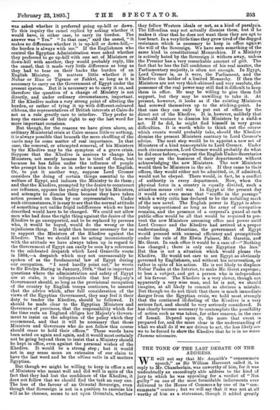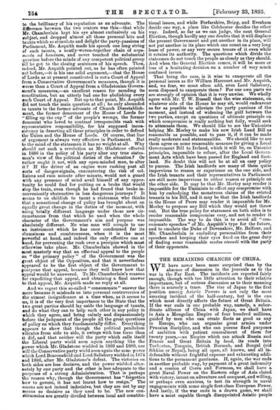THE TONE OF THE LAST DEBATE ON THE ADDRESS.
WE will not say that Mr. Asquith's "consummate speech," as Sir William Harcourt called it, in reply to Mr. Chamberlain, was unworthy of him, for it was undoubtedly an exceedingly able address to the kind of jury to which he was appealing for a verdict of "Not guilty" on one of the most formidable indictments ever delivered to the House of Commons by one of its "con- summate" orators ; but we will say that it was not at all worthy of him as a statesman, though it added greatly to the brilliancy of his reputation as an advocate. The difference between the two orators was this—that while Mr. Chamberlain kept his eye almost exclusively on his subject, and dropped almost all those personal hits and taunts which 30 stimulate and delight the party-passions of Parliament, Mr. Asquith made his speech one long string of such taunts, a neatly-woven-together chain of argu- man(a ad hominem, and never touched the substantial question before the minds of any competent political group till he got to the closing sentences of his speech. Then, indeed, Mr. Asquith pointed out, as he has often pointed out before,—it is his one solid argument,—that the House of Lords as at present constituted is not a Court of Appeal from a Conservative Government's measures, though it is worse than a Court of Appeal from a Gladstonian Govern- ment's measures,—an excellent reason for mending its constitution, but an utterly bad one for abolishing every such Court of Appeal. But up to that point, Mr. Asquith did not touch the main question at all ; be only abounded in taunts to the former advocate of Church Disestablish- ment, the former denouncer of the House of Lords for "filling up the cup" of the people's wrongs, the former democrat who loved to contrast irresponsible rank with representative responsibility, for his supposed incon- sistency in deserting all these principles in order to defend the Union and the House of Lords. Of course, that line of argument is always very effective in Parliament. But to the mind of the statesman it has no weight at all. Why should not such a revolution as Mr. Gladstone effected in 1886 in the policy of his party alter any true states- man's view of the political duties of the situation ? Or rather ought it not, with any open-minded man, to alter it ? If the driver of an engine were rushing past all sorts of danger-signals, encountering the risk of col- lisions and ruin minute after minute, would not a guard with any presence of mind avail himself of any oppor- tunity he could find for putting on a brake that would stop the train, even though he had found that brake in- conveniently obstructive in less dangerous journeys ? It seems to us childish to taunt a statesman who thinks that a sensational change of policy has brought about an equally great change in the duties of the moment, with using totally different language under these new cir- cumstances from that which he used when the whole character of the Government's aim and purpose was absolutely different. No wise man will scruple to use an instrument which he has once condemned for its clumsiness and cumbrousness, when it is the most powerful at hand, and indeed the only effective one at kand, for preventing the rush over a precipice which must otherwise take place. Mr. Chamberlain showed in the most masterly way that an effectual appeal to the people on "the primary policy" of the Government was the great object of the Opposition, and that it nevertheless appeared to be the first object of the Government to postpone that appeal, because they well knew how that appeal would be answered. To Mr. Chamberlain's reasons for expediting that appeal, and obtaining a final answer to that appeal, Mr. Asquith made no reply at all.
And we regret this so-called "consummate" answer the more because it misleads us into personal controversies of the utmost insignificance at a time when, as it seems to us, it is of the very first importance to the State that the two great parties should lay aside the language of taunts, and do what they can to help each other in any policy in which they agree, and bring calmly and dispassionately before the judgment of the people all the great questions of policy on which they fundamentally differ. Everything appears to show that though the political pendulum vibrates from side to. side, it swings with less force than it did, and that neither will the party which calls itself the Liberal party wield soon again anything like the power which Mr. Gladstone wielded in 1869 and 1880, nor will the Conservative party wield soon again the same pa wer which Lord Beaconsfield and Lord Salisbury wielded in 1874 and 1886, after Mr. Gladstone's defeat. The victories on both sides are less decisive, and the power wielded alter- nately by one party and the other is less adequate to the purposes of a strong Administration. That is perhaps the reason why, though the Government has "forgotten how to govern, it has not learnt how to resign.' The omens are not indeed indecisive, but they are not by any means so decisive as they used to be. The new con- stituencies are greatly divided between local and constitu- tional issues, and while Forfarshire, Brigg, and Eveshatn decide one way, a place like Colchester decides the other way. Indeed, so far as we can judge, the next General Election, though hardly any one doubts that it will displace the present Government and put another in its place, will not put another in its place which can count on a very long lease of power, or any very secure tenure of it even while it retains its authority. The questions which divide the statesmen do not touch the people as closely as they should. And when the General Election comes, it will be more or less of a hesitating decision on a number of very much confused issues.
That being the case, is it wise to exasperate all the personal issues as Sir William Harcourt and Mr. Asquith, and, we fear, we must often add, even Lord Salisbury, seem disposed to exasperate them ? For our own parts we are strongly of opinion that it is very unwise. We wholly agree with Mr. T. W. Russell that the wise statesman, on whatever side of the House he may sit, would endeavour as far as possible to alleviate the party passions of the moment, and instead of widening the gulf between the two parties, except on questions of ultimate principle on which compromise is really nothing but folly, would seek to attenuate them. We should like to see the Unionists helping Mr. Morley to make his new Irish Land Bill as reasonable as possible, and to pass it, if it can be made really moderate and statesmanlike. We should like to see them agree on some reasonable measure for giving a Local Government Bill to Ireland, which it will be, on Unionist principles, impossible to refuse, after the Local Govern- ment Acts which have been passed for England and Scot- land. No doubt this will not be at all an easy policy to pursue. The Irish landlords are many of them quite impervious to reason or experience on the one side, and the Irish tenants and their representatives in Parliament are still more impervious to either reason or principle on the other side. It may be that Mr. Morley may render it impossible for the Unionists to effect any compromise with him by embodying the monstrous claims of the evicted tenants in his Bill, and it may be that the Irish landlords in the House of Peers may render it impossible for Mr. Morley to propose any Bill which they would not throw out. But the true policy for statesmen on both sides is to render reasonable compromise easy, and not to render it impossible. The way to do this is to avoid all " con- summate speeches" of Mr. Asquith's type for the future, and to emulate the Duke of Devonshire, Mr. Balfour, and Mr. Chamberlain in excluding personalities from their speeches and keeping their eyes fixed on the great duty of finding some reasonable modus vivendi with the party of their opponents.



































 Previous page
Previous page